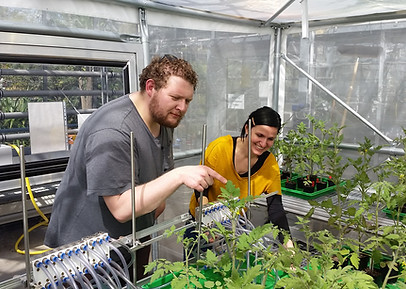
New Phytologist
interviews Ainhoa Martínez-Medina
Nov 30, 2016 Mike Whitfield
To If you need help defending your tomato plants from pests, enlisting the help of a fungus might not be at the top of your list. But a recent study, published in New Phytologist, has shown that a fungus could actually be an unlikely ally in the greenhouse. Similar to the beneficial microbes that inhabit the human gut, plants can play host to a range of microbes, some of which form associations with plant roots and provide their hosts with essential functions that help with nutrient acquisition and protection against pests.
With a little help from my fungus: tomato plants are more resistant against nematodes when colonized by a fungus
Nov 14, 2016 Dr. Tabea Turrini

Plants are constantly challenged by hungry animals and infectious microbes. Tomato plants, for example, are often infested with little worms that feed on their roots. A fungus can help them to better defend themselves against these attacks, scientists report in the journal New Phytologist. In the future, farmers and gardeners might benefit from the new findings, as they may be able to use a kind of 'fungus-vaccinatio'n to prepare their tomato plants for impeding an infestation with worms.

Free to download: definitive guide to plant #defense#priming by Ainhoa Martinez-Medina et al.
Sept 19, 2016 Trends in Plant Science
Defense priming conditions diverse plant species for the superinduction of defense, often resulting in enhanced pest and disease resistance and abiotic stress tolerance. Here, we propose a guideline that might assist the plant research community in a consistent assessment of defense priming in plants.
Press Release

Lange Nacht der Wissenschaften 2016
June 24, 2016
Wissenschaftliche Institutionen in ganz Leipzig öffnen ihre Tore für die Öffentlichkeit. Das Programm richtet sich an BesucherInnen aller Altersgruppen. Erleben Sie Forschung ganz nah!
Das Deutsche Zentrum für integrative Biodiversitätsforschung (iDiv) ist an mehreren zentralen Orten vertreten: In der Biocity bietet iDiv einen Vortrag und zwei Infostände, am Augustusplatz einen weiteren Vortrag und im Botanischen Garten der Universität Leipzig eine Ausstellung.

Ainhoa Martinez Medina chosen to organize next Gordon Research Seminar on Plant Volatiles
Apr 24, 2016
Dr. Ainhoa Martinez Medina has been selected as chair of the next Gordon Research Seminar (GRS) on Plant Volatiles. Gordon Research Seminars are a unique opportunity for early career scientists to present and discuss new data and ideas. The Gordon Research Seminar on Plant Volatiles will be held in conjunction with the Gordon Research Conference on Plant Volatiles, in Italy in 2018

Ainhoa Martinez Medina chosen to organize next Gordon Research Seminar on Plant Volatiles
Apr 24, 2016
Dr. Ainhoa Martinez Medina has been selected as chair of the next Gordon Research Seminar (GRS) on Plant Volatiles. Gordon Research Seminars are a unique opportunity for early career scientists to present and discuss new data and ideas. The Gordon Research Seminar on Plant Volatiles will be held in conjunction with the Gordon Research Conference on Plant Volatiles, in Italy in 2018

FSU grant for iDiv molecular biologist
Oct 23, 2015
Molecular biologist Dr Ainhoa Martinez-Medina is one of eleven young researchers, which are funded from the Friedrich Schiller University Jena in order to apply for third-party funds. For this purpose, she will be supported until the end of 2017 with 20,000 euros for equipment and personnel to expand her work on the biochemical interactions between plants and insects. She works in the iDiv core group "Molecular interaction Ecology" of Professor Nicole van Dam and is studying the molecular and phytochemical key elements that underlie the effects of root symbionts on plant multitrophic interactions. This includes, for example, the communication of plants with insects: With the help of volatile organic compounds (VOC) plants can attract natural enemies to combat herbivores like caterpillars. The molecular mechanisms behind these complex processes are still not well understood. The iDiv researcher wants to gain new insights with experiments on tomato plants, herbivores and parasitic wasps in the coming months. "The support of the FSU Jena closes a gap in the CV of young researchers and may be an important step in their careerallowing me to apply for larger projects in the near future" said Ainhoa Martinez-Medina who was very pleased with the grant. Through the "Programm zur Förderung der Drittmittelfähigkeit“ (Programme for the promotion of the third-party funding ability) the Jena University supports young researchers with a total of around 112,000 euros.